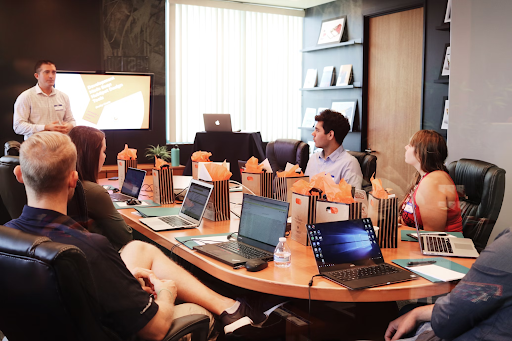
The 7 habits of inspirational L&D professionals
Highly effective Learning and Development professionals have seven habits which define the learning process within an organisation. The habits are intertwined with the very foundations of organisations and they promote stellar learning culture and work ethic.
Our research has uncovered what these common traits are.
1. Professionals understand communication is key
Learning and development culture must be an integral part of an organisation, which means the communication of the importance of learning starts from the hiring process; employees need to understand and recognise that continuing professional development is key to their being respected and valued within an organisation and that only through continued learning can they continuously perform at their best.
Communicating effectively is one of the biggest habits of highly effective Learning and Development professionals, for supporting learning and rewarding employees who seek to be the best and gain new knowledge and skills is the key to growing a highly talented workforce.
2. Professionals trust management
It is much harder to learn and gain new knowledge and skills as an employee if there is no trust with those in management. Employees will invest their time into learning initiatives if they trust and believe in their manager to support them, but without that support and recognition professionals can and will elope from continued development.
Within corporate organisations, this is a challenge, for it is only natural for managers to think about their own position when other professionals start to gain new skills and knowledge.
However, corporate organisations must overcome this challenge, as without trust there can be no aspiring for advancement which translates to a lack of take-up on learning initiatives.
3. Professionals take risks
For the vast majority of employees, the biggest lessons learned will come from risk-taking. This is a habit among Learning and Development professionals that should be encouraged, but only with risks that don't directly affect business operations. At a minimum, mistakes made by employees should be addressed by the manager in non-punitive conversation.
Whatever the result of risk-taking (a screw-up or success), employees learn best from risk-taking by sitting down and examining what happened, what can be learnt, and what should be done in the future. Many valuable lessons can be learnt from failure and success, and organisations would be wise to not slam employees who wish to take a risk.
4. Professionals like to engage with others
Every stakeholder; employees, customers, business partners, investors; within an organisation will have something to offer to the collective wisdom of an organisation. These stakeholders need to be engaged to find out what they know and how that knowledge can benefit others, but also to find out what they don't know, so a learning initiative can be applied.
Engaging with stakeholders on a one-to-one basis, or in groups, is a great way to share knowledge. Learning and Development professionals benefit from engagement massively for it promotes creativity and forward-thinking, and it will offer up plenty of information about individual performance, team work, organisational decisions, plus much more.
5. Professionals value feedback and reflection
In a learning culture, feedback is essential. Feedback on what learning professionals do, and feedback on what needs to be done to improve, is an integral part of the learning process for it promotes reflection and professional improvement. It is at this stage that targets and KPIs can be applied to the learning and development initiative to help employees get the most out of their work.
Organisations need to remember that the majority of learning happens when people talk to one another and share their experiences about problem-solving, planning, and more. Communicating with other professionals and giving feedback on learning is a common habit among Learning and Development professionals.
6. Professionals support social learning
The modern learning culture is radically different to the learning culture of ten years ago. Now, it is an accepted practice for a workforce to support one another for individual, team, and organisational learning.
Social learning isn't simply about talking to one another, though; it's about learning through observation and direct instruction, two methods of learning which form an integral part of the social learning theory.
Social learning in the informal sense, such as coaching, mentoring, and experiments, are the most engaging types of learning for highly effective Learning and Development professionals. In a modern organisation, this type of learning is highly structured.
7. Professionals value time
In a learning culture, professionals understand that time management is essential, but also that there is no better use of one's time than learning or helping other people to learn.
Highly effective Learning and Development professionals believe that learning is the key to success, and therefore they plan their entire week around learning initiatives. This is great for organisations because professionals 'get into the books' without any pressing and have the drive to achieve great things.


